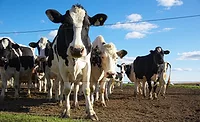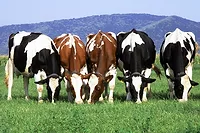Is Grass-Fed Organic Cattle Really Less Likely to Contain Bacteria?
Is organic ground beef safer than conventional beef? It is, according to Consumer Reports’ “How Safe is Your Ground Beef?"
According to the special report published this week, beef from conventionally raised cattle is more likely to be contaminated with bacteria, particularly Staphylococcus aureus. For their purposes, Consumer Reports defined “sustainably-produced” beef as meat that falls into at least one of the following categories:
- meat was obtained from cattle raised without use of antibiotics
- cattle was either grass-fed or otherwise deemed "organic"
Consumer Reports tested 300 packages of ground beef for Clostridium pergringens, seven strains of Escherichia coli, Enterococcus, Salmonella and Staphylococcus aureus. All meat was obtained from various big box grocers and natural food stores in 26 U.S. cities. Bacteria was reportedly detected in all of the beef samples tested. A rather large portion of the conventional beef tested--80 percent of it--contained two types of bacteria.
The beef industry has quickly responded to the report and is adamant that Consumer Reports' findings do not tell the whole story.
The National Cattlemen’s Beef Association (NCBA) calls the report “misleading” since the bacteria found in Consumer Reports’ tests are not the type of bacteria commonly associated with foodborne illness in ground beef. NCBA says that the report could “increase consumer confusion about food safety” just before the Labor Day weekend when consumer demand for beef is high.
Similarly, the North American Meat Institute (NAMI) says that what’s not cited in the report--zero findings of Shiga toxin-producing E. coli or highly pathogenic Salmonella--is very important because those bacteria are the biggest risks associated with beef consumption. NAMI believes this is proof that ground beef is currently "as safe as ever".
Both Consumer Reports and meat experts do agree on one thing--the best way to ensure food safety when it comes to ground beef is to make sure it is properly cooked to 160° F.
Looking for quick answers on food safety topics?
Try Ask FSM, our new smart AI search tool.
Ask FSM →








